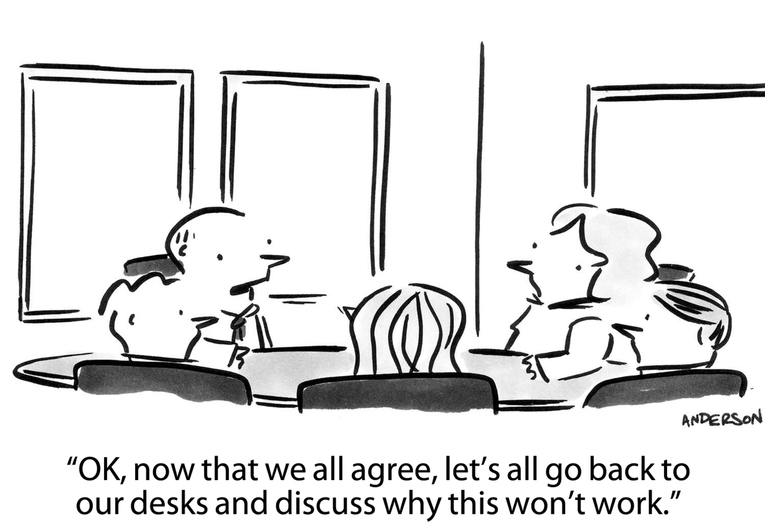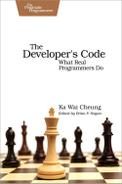| Essay 25 | Eliminate the “We” in Productivity |
In productive team development, clarity is king. Yes, knowing who is responsible for which piece of the puzzle is critical. But it’s just as important to know who isn’t going to be responsible for that piece as well. They have other pieces to handle.
When you’re communicating with your co-workers or your clients, particularly in meetings and over email, get out of the habit of using the word “we.” Instead, say exactly who.
Observe how often you’re using the word “we” the next time you’re in a technical meeting. When you say “we,” you’re probably really saying “some of us,” “just a few of us,” or oftentimes even just you (or John or Mary). Rarely does your “we” actually mean the collective whole.

But that’s the impression that using the “w” word creates. It suddenly throws the blanket of responsibility, unnecessarily, over everyone. It blurs the line between who really should be concerned about a problem and those who should be focusing on other tasks. More importantly, it hides who you should really talk to if you want to provide feedback.
For instance, if you’re writing a tool to transfer data off a legacy database and need to know what the schema looks like for the Customers table, you don’t need to consult with the entire company. A front-end designer probably doesn’t know or care. Even if the database is managed by a team of people, find the exact person who’s responsible for getting you what you need. Don’t say that we need to get the schema; say exactly who needs to get that information to you.
If you don’t know who, then pick someone. They’ll either get you what you need or delegate that responsibility to the right person. Specifying responsibility directly gets things moving in one direction: forward.
And that’s just the opposite of what the “we” mentality condones. “We” turns into fifteen people listening in on a phone call, twelve recipients copied on an email, or a roundtable of people writing notes about things they don’t understand or don’t really matter to them. “We” just turns into a big cloud of talk when only a few people really understand the language being spoken. “We” makes things exponentially noisier than they need to be.
“We” Feeds the Noise Virus
The problem isn’t just that it causes more noise; “we” is also the ammo that prolongs and multiplies noise. When you let “we” into the conversation, you’re inviting the talk to get even bigger and bigger over time.
Why? “We” lets you ask questions that don’t have to be answered immediately. They often sound rhetorical. It opens up new, often uncritical, avenues of conversation that get away from the question you were trying to answer from the get-go.
-
What do “we” think about this feature addition?
-
Do “we” need to add more hardware to our web server? Can “we” get some performance metrics?
-
What can “we” do to make this user experience better?
These questions are often asked at the end of a meeting as the setup for another meeting. Even if it’s just one or two people really making the decision, everyone will agree that “we need to think more about this.” These questions appear perfectly normal to ask during a group meeting or within an email. But switch “we” for real humans—those warm-blooded mammals all around you—and suddenly those rhetorical questions turn direct.
-
What does Jennifer think about this feature addition?
-
Does Mike need to add more hardware to our web server? Can Anthony get us some performance metrics?
-
What can Tom do to make this user experience better?
When you direct the questions at someone, people get moving.
The Bystander Effect
“We”-type questions often sputter because it’s human nature. It’s no different from the bystander effect: a person in an emergency situation is likely to get help faster from a lone bystander than from any single person within a large group of bystanders.
According to a basic principle of social influence, bystanders monitor the reactions of other people in an emergency situation to see whether others think it is necessary to intervene. Since everyone is doing exactly the same thing (nothing), they all conclude from the inaction of others that help is not needed.[9]
When more people are put into a situation, there’s less of a chance that any one of them will do anything to resolve it. Instead, pinpoint the exact people responsible for the task.
As simple as it may sound, swapping “we” for direct names (or even “I”) makes a huge difference in team productivity. In meetings, in emails, or over the phone, using “we” slows down momentum, leaving your team less aware of who should do what and who shouldn’t do what. “We” is the verbal high-fructose corn syrup of productivity. It might sound sweet, but it’s loaded with a whole load of fluff that’s just not good for you.
As we’ve seen in the last few essays, sometimes productivity is simply about reducing complexity: working with fewer people, delegating responsibility to a single person, or eliminating the external noise of team development. In the next chapter, we’ll focus on complexity in our software.
Footnotes
| [5] | |
| [6] | |
| [7] |
http://money.cnn.com/galleries/2010/technology/1003/gallery.dot_com_busts/9.html |
| [8] | |
| [9] |
